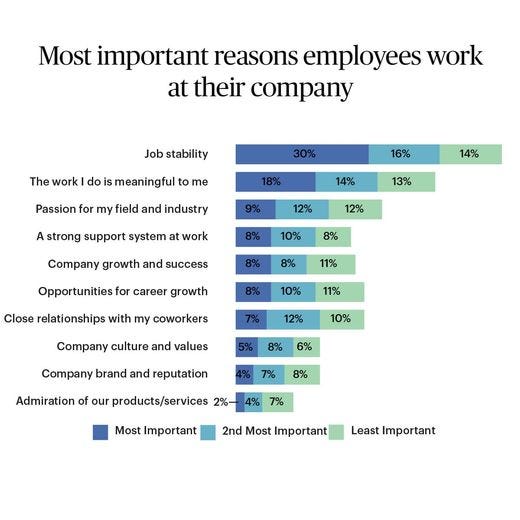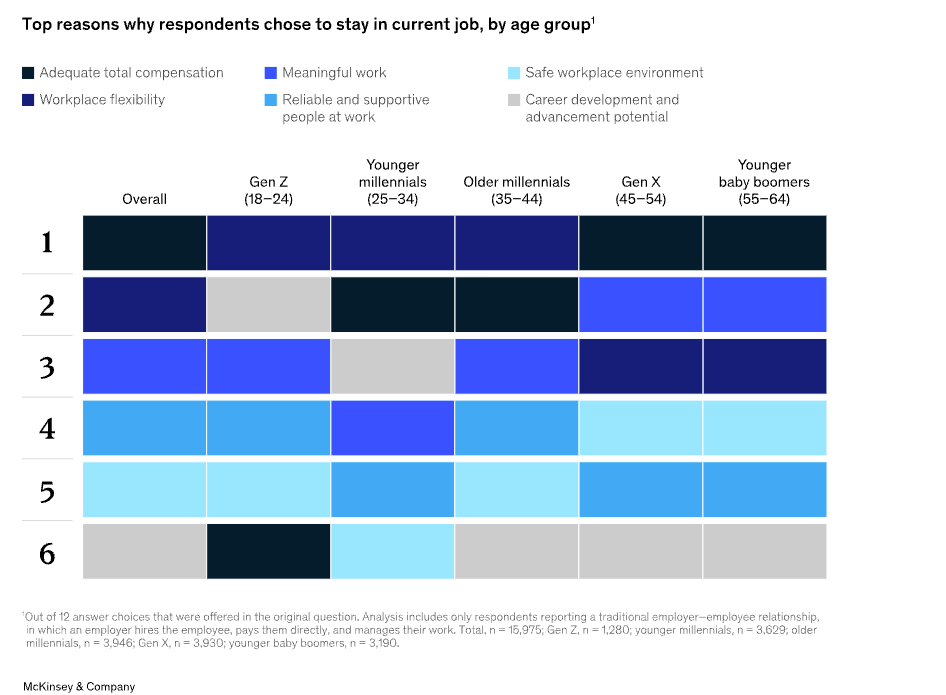What Do Employees Want out of Jobs and Careers?
Re-thinking the employer side of the Employer-Employee Relationship
Hello, and welcome to this week’s newsletter. Thank you to our new subscribers. If you’re new, drop me a line and tell me what you are working on these days
This Week’s Newsletter:
What Should Employers Offer to Employees?
People to Follow
I wrote last week about the need to re-think the employer-employee relationship and I’m going to use this week to riff on something that is similar but perhaps at a deeper dive. This is still very much a raw work in progress so I’m open to your thoughts and feedback.
One of my hypotheses about the current state of the social contract between employees and employers is that it is very transactional.I give you x y and z in exchange for your labor, and you get a, b, and c in return.
While there is nothing wrong with that, just like our friendships that are transactional breed a certain set of behaviors, so do our transactional relationships with our employees, in that if we see another opportunity that seems better, we’ll just get up and leave. This might be fine for some companies, but others, especially those who want to compete in the market or evolve, need their employees to grow, need them to stay, etc. I think that if companies want those kinds of employees, the way they approach that employee-employer contract needs to shift to something more meaningful and impactful.
As I said last week, the other things that could give employers an upper hand in managing that transactional relationship, such as a pension, lifetime employment etc are gone. So if you want to have a more impactful and deeper relationship between you and your employees, what can you include in your employee value proposition and what can you offer?
To start, I did some research to find out more broadly, what do employees want out of their jobs and employers? I came across a study from Paychex and Executive Networks and here is what they said:
When asked to consider factors outside of compensation and benefits, the top-ranked reasons employees work at their companies were:
Job stability
Meaningful work
Passion for their field of work or industry
A strong support system
Company growth
Opportunities for one’s personal career growth
The flipside of this is also asking, what makes employees leave?
To answer this question, I turned to some recent research from McKinsey and Co which has been studying this for a while now. Their recent research, which is framed around debunking generational differences in worker preferences found that the top five reasons (generally in line across all generations were) why employees left a company were:
Adequate total compensation
Career development and advancement potential
Meaningful Work
Workplace Flexibility
Reliable and supportive people at work
Workplace safety
Interestingly enough, McKinsey also did the flipside of this question in this research when they asked employees “what would make you likely to stay?”
Here, there were some generational differences in the responses. The headline being that Gen Z tends to want to stay for factors outside of compensation.
To be sure, McKinsey made it clear that both hygiene factors (compensation) and motivating factors and the importance of both. They write:
For attracting new talent, it seems that the strongest strategies involve both “hygiene” factors, such as compensation, and “motivating” factors, such as meaningful work and career development; it’s not sufficient to provide either hygiene or motivators without the other. This is true even for Gen Zers, who rank meaningful work just as highly as workplace flexibility as a reason for taking a new job. Compared with older employees, Gen Zers also rank compensation as a slightly less important factor.
What Else Could Employers Include in their part of the Bargain?
There isn’t much detail on the survey construction but I was curious about what are the types of things that an employer could provide to an employee as part of their side of the employer-employee contract. So I decided to come up with a few ideas based on some conversations this week, and wanted to share them below. Note: all of these are non-financial, as I presume adequate and equitable compensation as a baseline:
Portable Skills - These are tangible skills that are relevant, timely, and portable in that they can be used by the employee even after they leave your organization. This ensures they are employable and fueling their own development and growth
Credibility and Social Proof - These are actual work or educational experiences that provide credibility and “proof of work” that enables an employee to grow themselves and make themselves ready for additional growth opportunities. As an extension of this, these could also be “credentials” from a company. For example, for a long time, GE’s Financial Management Program (FMP) was the gold standard for corporate finance. Imagine a world where that branding means something explicitly in the form of a certification or badge.
Call Ups - If you talk to any minor league baseball player, one of their proudest moments is when they get called up to the big leagues. Similarly, if you can give your employees opportunities for “call ups” where they get a chance to be on a bigger stage than they could have previously, that might be a value add.
Step Change Experiences - When we know where we are going, we often have to work harder or more diligently to go down that path. But for many of us, we do not always know what will come next. That is why step-change experiences+opportunities are so critical. These are opportunities that allow us to zig and zag in ways we didn’t envision. But when an employee gets a chance to get exposed to an assignment, role, or opportunity that allows them to eventually move into something they could not have predicted or seen. These will be incredibly more important and mutually beneficial when it comes to emerging technologies
Self-Data - When it comes to development and growth, many employees struggle with a “cold-start” problem. They know they want to start but they have trouble revving up the engine. One way to help is by providing them with data and insights about their skills, experiences, or strengths that they can then use in other settings. Helping them construct their “baseball card” or “profile” to help them better understand themselves and their abilities is also a great way to help them see how they are growing and progressing
Social Capital - I’ve written about social capital previously, but providing your employees with the access to capital they need to continue advancing and moving throughout the course of their career. Being able to give them the boost or access to people, relationships, opportunities that they could not get on their own could pay off for them in the short and long term.
Practice Fields - Getting safe spaces to practice, test and experiment with new strengths, interests or skills could help employees explore genuine interests and curiosities that could also help the business.
This idea is still pretty raw, but I’d love to hear what you think, and what other ideas employers could provide to their employees to strengthen their side of the employer-employee contract.
People To Follow
Here are some people you should consider checking out if you want to learn more about ideas behind the employee-employee relationship, retention and re-thinking work:
Steve Cadigan - Steve is the former CHRO of LinkedIn, and an ardent proponent of redefining the world of work today.
Lars Schmidt - Lars is a fellow Linkedin Podcast Academy Podcast Host of the Redefining Work Podcast. He interviews leaders who are thinking and dreaming differently about the world of work.
Laurie Ruettimann - Laurie is a former HR Executive, consultant, and the Host of the Punk Rock HR podcast. She takes a unique and different approach to think about HR, and how HR can create a better and different world of work.
Jeff Schwartz - Jeff is a VP of Insights at Gloat, and an author and thought leader on career mobility. His articles and insights provide a new and unique point of view on the workplace and developing talent.
Susan LaMotte - Susan is the CEO of Exaeo, an employer branding consultancy and one of the foremost experts in employer branding and employer value propositions.
Lynda Gratton - Lynda is an author, professor and consultant around work, leadership and management. Her book Redesigning work is often cited as a good model for thinking differently about the workplace fit for today’s modern age
Sophie & Dave Smallwood - Sophie and Dave are the Co-Founders of Roleshare, a platform that helps companies hire diverse talent through sharing of jobs and roles.
David Fano - Dave is the Founder of Teal, a career infrastructure platform, and a guest on Edge of Work in season 1. He’s building a modern career platform fit for the purpose of today’s employers.
Christina Wallace - Christina is an author and professor of entrepreneurship at Harvard Business School. Her recent book The Portfolio Life offers a re-think of how we can use new frameworks for navigating careers and life, just like a financial portfolio.
Cali Williams Yost - Cali has been studying and consulting on remote work for decades, and has been a leading voice in getting leaders to think differently about where to work
Eve Rodsky - Eve is NY Times Best Selling Author and expert on family dynamics and relationships. She is trying to re-think equity and inclusion in the workplace by helping couples rethink and redistribute the work of parenting.
Finally, If you’re looking for some help for your learning and development, team meetings or professional development for next year, I’d love to work with you: Here is how I might be able to assist:
Team Trainings & Professional Development: Happy to facilitate training or professional development opportunity for your team & organization - common topics include: career development, influence without authority, effective relationship building, and stakeholder management
Support Your Offsites & Meetings: Speak or facilitate at your team’s offsite. Need a guide to facilitate or speak at an upcoming offsite, QBR or all hands? Happy to engage here.
Leadership & Learning Programs: Formal training and leadership development in your company, such as new manager or new leader training, or skill-based programs.
Feel free to contact me directly for more details!
That’s all for this week. Have a great week!






